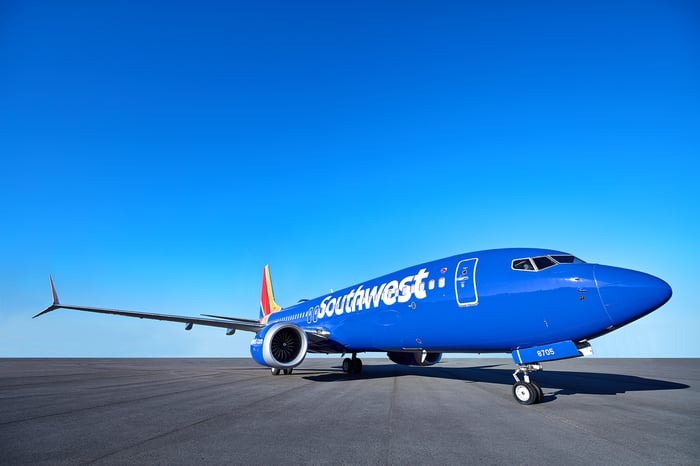The last five months have been hard for airlines like American Airlines (AAL 0.64%), Delta Air Lines (DAL -0.58%), Southwest Airlines (LUV 1.10%), and United Airlines (UAL -0.08%). These carriers (and their smaller peers) have reported enormous losses, as the COVID-19 pandemic has crushed air travel demand.
The damage would have been far worse but for the Payroll Support Program (PSP) included in the CARES Act relief legislation. The PSP is covering the majority of airlines' labor costs for the second and third quarters. That said, airlines and their employees were facing a "Black Thursday" of mass layoffs and furloughs on Oct. 1, as air travel remains severely depressed. However, it now seems likely that they will see another six-month reprieve, due to growing bipartisan support for a PSP extension.
The origin of the payroll support program
The COVID-19 pandemic hit the U.S. in earnest in March. As the month progressed, daily case reports surged from dozens to hundreds to thousands to tens of thousands. This sparked a rapid collapse in air travel demand. On March 1, TSA passenger screenings were within 1% of 2019 levels. By March 31, the TSA was reporting a 93% year-over-year plunge in throughput.
With bookings falling to near zero and customers canceling existing travel plans, American, Delta, and United each experienced daily cash burn of $100 million or more in late March and early April. Barring government intervention, every U.S. airline would have had to furlough a substantial portion of its workforce -- and possibly even shut down temporarily, as numerous foreign airlines did. This could have compromised the industry's ability to restart itself when demand returned.

Image source: American Airlines.
The purpose of the PSP was to avert this problem. The federal government agreed to provide $25 billion of payroll funding for major airlines: enough to cover the vast majority of their labor costs. Approximately 70% of the funding consisted of outright grants, with the rest coming in the form of low-interest loans. In return, the airlines agreed (among other things) not to implement any involuntary layoffs or furloughs until at least Oct. 1. The goal was to provide a bridge over the worst part of the pandemic, so that airlines wouldn't furlough workers in April only to find themselves short-staffed in July or August.
Implicit in the program's six-month duration was the belief that the U.S. would get the pandemic mostly under control by the summer or fall. Unfortunately, that assumption wasn't borne out. After briefly receding during May, the rate of new COVID-19 cases surged beginning in mid-June. That halted the nascent air travel recovery by the beginning of July, as United Airlines reported a month ago. In recent days, TSA throughput has averaged just 27% of year-ago levels.
Congress considers an extension
Perhaps sensing that the demand recovery was at risk of petering out, six major airline unions banded together in late June to call on Congress to extend the PSP until March 31, 2021. Whereas airlines lobbied hard for the initial PSP funding in March, these unions have taken the lead this time around (although American, Delta, Southwest, and United all support a PSP extension).

Image source: Southwest Airlines.
The unions' lobbying efforts appear to be paying off. In late July, more than 200, mainly Democratic, members of the House of Representatives -- representing a slight majority of the chamber -- sent a letter to Congressional leaders urging them to extend the PSP to the end of March. This Wednesday, 16 Republican senators wrote a similar letter to Senate leaders, calling for a "clean" extension of payroll support.
President Trump has also signaled his support for a PSP extension to help airlines. With such broad bipartisan support, it seems quite likely that the PSP will be extended in the next round of COVID-19 relief legislation.
Whether this is the best use of taxpayers' funds is far from clear. To a large extent, it may depend on when an effective COVID-19 vaccine becomes widely available. If vaccines hit the market in early 2021, air travel demand may improve enough by the spring for airlines to avoid mass layoffs and furloughs. If the timetable for vaccines is significantly longer, a PSP extension might only kick the can down the road, postponing furloughs by six months but not averting them.
Great news for airlines if it happens
Regardless of the public-policy merits, a PSP extension would be great news for airlines. It would be particularly welcome news for full-service airlines like American Airlines and United Airlines that have weak balance sheets and are heavily dependent on business travel that will likely be slow to return.
Indeed, if the PSP continues with the same terms through next March, many airlines may be able to break even over the next few quarters. Whereas PSP funds only partially offset airlines' cash burn this spring -- during the peak of the pandemic -- every major airline has significantly reduced its cash burn since then as ticket sales have started to outpace refunds. Six additional months of payroll support will put airlines in a much-better position to participate in the eventual economic recovery from the COVID-19 pandemic.





